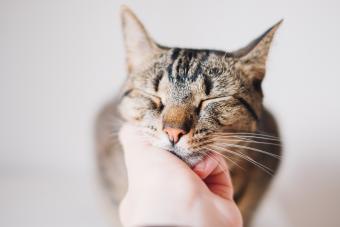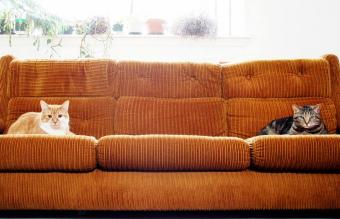
If you continue finding cat urine on your bedding, you might be desperate to know why your cat keeps peeing on your bed. There are several reasons behind this behavior. Your cat might be stressed out, or grossed out by their litter box. They may be marking, or they might have a medical problem, such as feline idiopathic cystitis or even bladder stones. Get to the bottom of why your cat chooses to pee on your bed so you can help them and keep your bed pee-free.
Why Does My Cat Pee On My Bed?
Have you been racking your brain to figure out why your cat pees on your bed? The answer might be right under your nose, or possibly in the litter box.
1. There's a Medical Problem
There are several medical conditions that could prompt a cat to pee on your bed instead of in their litter box.
- Kidney disease
- Diabetes
- Urinary tract infection (UTI)
- Feline idiopathic cystitis (FIC)
- Bladder stones
- Bladder cancer
Some of these illnesses, such as kidney disease and diabetes, cause cats to drink more fluids, so they inevitably have to urinate more frequently and in larger amounts. Sometimes, they can't make it to the litter box quickly enough.
Other illnesses, including UTI, FIC, bladder stones, and bladder cancer, lead to inflammation of the bladder, which can be uncomfortable and make a cat have to pee more frequently. They might accidentally dribble urine in your bed or not realize how badly they have to pee until it's too late.
How to address the problem: If you suspect your cat has a medical issue, you need to take them to your vet. A visit to your veterinarian can allow you to rule out these serious problems.
2. They're Feeling Stress
Changes to their environment can irk cats. Any new people, pets, furniture, or even your absence can cause them to pee inappropriately. The changes don't necessarily have to involve your bed, although a new person or pet sleeping in your bed could prompt your cat to urinate on the new person's or pet's scent.
Veterinarians suggest that a cat peeing on your bed or laundry specifically is often the result of psychological stress. Your cat might be trying to communicate to you that they're worried. The bed-wetting is essentially a message. In order to stop it, you'll need to address whatever is stressing them out.
How to address the problem: If it's another person or a new pet that's upsetting your cat, you might need to work on building a new relationship between your new housemate and your cat. This will take time, and you might need to address several behavioral issues around your cat's sleep. In the meantime, you may need to keep your cat out of your bedroom until you have figured out and addressed whatever is stressing them out.

Pheromone sprays, medication, and other solutions may help put your cat at ease during times of stress.
3. They Can't Access Their Litter Box
It's possible your cat cannot physically access the litter box. Cats with arthritis or overweight cats may have difficulty stepping in and out of the litter box, and your bed might feel like a more convenient and less painful option.
How to address the problem: Think about where your litter box is situated, along with how much effort it takes to access it, or whether your cat is too large to fit in the box. Most elderly and large cats do best in a wide litter box with a shallow opening.
4. They Won't Use the "Wrong" Type of Litter
Cats are often referred to as "fussy felines" for a reason. Some are incredibly finicky. If your cat doesn't like the new type of litter you're using, they might refuse to go in their box and will instead pee on your bed. It's possible they don't like the smell or the way it feels under their feet.
How to address the problem: Think back to when the bed soiling started, and if it coincided with you switching to a new litter, this might be the root of your problem. You can try switching back to the old litter. If this helps, but you still want to switch litters, try mixing the new litter in slowly. Begin with just a small scoop - about 10 to 20% of the total amount of litter you use - for a week or more. Slowly add more of the new litter over time. This may help your cat accept their new litter. You can also try different litter options to see what your cat prefers.
5. Their Litter Box is Dirty
How often do you scoop your cat's litter box? If you're not doing it often enough, waste will accumulate, and it'll begin to smell. There's a chance your cat might become frustrated enough that they'll act out and pee in inappropriate places.
How to address the problem: To get back on your cat's good side, you'll need to get scooping, and keep it up on a consistent basis. Experts suggest scooping at least once each day, or as often as you can.

6. Your Intact Cat is Marking
Cats who haven't been spayed or neutered are more likely to spray due to hormonal marking tendencies. Unneutered male cats are the biggest culprits, though female cats in heat can also spray.
How to address the problem: Having your cat neutered or spayed will reduce their urge to pee in an undesirable place, like your bed.
Addressing Your Cat Urinating on Your Bed
Think about what may have happened right before your cat started the bed soiling. Did you go on a trip? Did you get a new puppy? Did you abruptly change your cat's litter? Did you forget to scoop the box for a week? These changes can give you insight into whether your cat might be peeing on your bed, because they're acting out. On the other hand, if they show any signs of illness, such as vomiting or increased drinking, the inappropriate peeing might be the result of a medical problem. The first step in addressing this issue is to have your cat examined by a veterinarian to rule out a physical cause, then discuss behavioral solutions.







